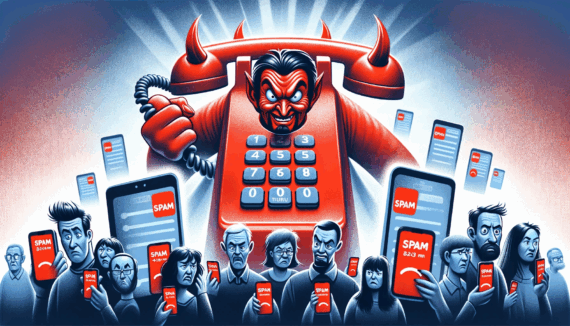Phone scams have become increasingly sophisticated in recent years. One-ring calls and other phone scams target millions of Americans each year, and the tactics used by scammers evolve quickly. New technology means that criminals can now clone voices using artificial intelligence, making it easier to impersonate loved ones and trick victims into sending money.
Meanwhile, reports of fraud continue to rise. In 2024, consumers reported more than $12 billion in losses to fraud, an increase of over $2 billion from 2024, and the median loss across all fraud reports was $497. According to a 2024 TrueCaller insights report, an estimated 56 million Americans were affected by scam calls in the previous year, with total losses topping $25.4 billion.
This article brings together the latest warnings from the Federal Communications Commission (FCC), the Federal Trade Commission (FTC), and cybersecurity experts to highlight the area codes currently associated with phone scams, describe common scam tactics, and offer practical tips to protect yourself and your family.
Why One-Ring Calls are Dangerous
The “one-ring” scam works by tricking you into returning a call. Scammers use autodialers to ring your phone once and hang up. The call appears to originate from what looks like a U.S. area code, but it actually forwards to a foreign premium-rate number. Returning the call can cost you $5 per minute or more as you rack up international charges.
Once they have you on the line, scammers use a variety of tricks to keep you talking and steal personal information. Examples include:
- Say-yes/four-word scam: The caller asks questions such as “Can you hear me?” to get you to say “yes.” There are concerns that the recorded voice may be used to authorize purchases or to clone your voice.
- Distress calls: Scammers play a recording of someone in distress, sometimes using an AI-cloned voice to impersonate a loved one. The hope is that fear will override logical thinking, prompting victims to send money.
- Secret admirer scam: You receive a call playing a song from a supposed admirer. The scammer then keeps you on the line to rack up charges.
- Imposter scam: The caller claims to be from your bank, the IRS, law enforcement, or another authority and pressures you to make an urgent payment. According to the FTC, legimitate agencies won’t call you out of the blue to demand payment or personal information.
Never Answer Calls From These Area Codes
Government agencies and cybersecurity experts keep track of internal area codes frequently used in scams. The FCC notes that scammers often spoof three-digit codes that look like U.S. numbers, but actually route to foreign countries.
- 232 – Sierra Leone (Frequently reported in one-ring scams)
- 242 – Bahamas (Has been linked to scam calls)
- 246 – Barbados (Often used in scam calls)
- 268 – Antigua and Barbuda (A well-known scam area code, sometimes called the 268 scam)
- 284 – British Virgin Islands (Reported in one-ring scams)
- 345 – Cayman Islands (Added to the watch list in 2025)
- 441 – Bermuda (Associated with phone scams)
- 473 – Grenada, Carriacou, and Petite Martinique (This code is so well-known that it is sometimes nicknamed the 473 scam)
- 649 – Turks and Caicos (Common in one-ring scams)
- 664 – Montserrat (Frequently used by scammers)
- 721 – St. Maarten (Added to scam warnings in recent years)
- 758 – St. Lucia (Occasionally appears in scam reports)
- 767 – Dominica (Long associated with one-ring scam calls)
- 784 – St. Vincent & the Grenadines (Appears in scam call lists)
- 809, 829, 849 – Dominican Republic (Multiple codes used for scam calls)
- 868 – Trinidad & Tobago (Reported in scam complaints)
- 869 – St. Kitts & Nevis (Recently added to scam-warning lists)
- 649 – the Turks and Caicos Islands
- 876 – Jamaica (Long-standing scam area code)
Note: Scammers can spoof any number, even one matching your own area code. Treat unfamiliar calls with caution, regardless of the displayed area code.
Other Common Phone Scams
The scams above are not the only way criminals try to separate you from your money. Here are some other common tactics highlighted by consumer-protection agencies and cybersecurity experts:
-
Imposter Scams: The caller will pretend to be an authority figure or someone they trust, such as a police officer, Internal Revenue Service agent, or family member.
-
Technical Support Scams: If you get a call from someone who wants to remove a virus or fix your computer, keep your guard up. It’s almost certainly a scammer.
-
Debt Scams: True swindling scumbags prey on people saddled with debt, offering to improve credit scores and forgive student loans for a fee. But they won’t follow through on their promise.
-
Lottery Scams: If someone declares you a winner, only to ask you to pay for the prize’s taxes and fees, then they’re probably swindling you.
-
Charity Scams: Scammers will stoop so low as to take advantage of your goodwill, posing as charities after a natural disaster. Instead of donating over the phone, consider giving through a site like Charity Navigator.

How To Avoid Phone Scams
If a caller threatens you or makes a promise that sounds too good to be true, chances are you’re dealing with a fraudster. That’s especially true if they ask you to send them money or divulge personal information. Here are a few tips to keep from getting scammed.
-
Take Your Time: Scammers usually call with a sense of urgency. They’ll say you’ve won a prize and need to claim it now, or they’ll impersonate a loved one and say that they need money as soon as possible. Instead of blindly agreeing to their requests, take time to think about and verify what they’re saying.
-
Be Skeptical: The Internal Revenue Service will never call before notifying you by mail. Likewise, companies need your written permission to call you with a robocall.
-
Don’t Answer Calls From Unfamiliar Numbers: If you don’t recognize a number, don’t answer. This gives you the chance to Google their number (and area code) and listen to their voicemail.
-
Don’t Send Money: Scammers will often insist that you send them money, especially via wire transfer, money transfer app, or gift card. Before you agree, take your time and make sure you know who you’re speaking to.
-
Block Calls: Although fraudsters often spoof their phone numbers, one way you can slow them down is to block their numbers. While that process will vary, we recommend that you ask your phone provider.
-
Join the National Do Not Call Registry: If you add your number to the Do Not Call Registry, then telemarketers legally can’t call you. Any sales calls you continue to receive are likely scammers. Visit donotcall.gov to sign up.
- Set up a secret word: Agree on a code word with family and close friends. If someone calls claiming to be a loved one in distress, ask for the secret word. If they can’t provide it, it’s likely a scam.
The Bottom Line
Technology advances, time marches forward, and scammers get more and more sophisticated. But no matter how cunning fraudsters might be, the truth is that they can’t force you to answer the phone, demand your social security number, or strong-arm you into sending money. So be skeptical, and if you don’t recognize a number, don’t answer.
For more practical tips and useful know-how, please sign up for our free newsletters.
More ways to stay safe
-
14 Things You Should Never, Ever Carry in Your Wallet – Losing your wallet can be a mild nuisance or a catastrophe, depending on what you keep inside. This guide lists 14 items—such as Social Security cards, passwords, and extra credit cards—that should stay at home.
-
Security PIN Codes You Should Never Use – Four‑digit PINs protect everything from your bank account to your phone, yet data show that almost one in 10 people use the same code. See the 50 most common PIN numbers (1234, 1111, 0000, and more) and change yours if it’s on the list.
-
6 Places You Should Never Keep Your Phone – Keeping your phone under your pillow, in your bra or hip pocket, or in the bathroom can damage your device and even affect your health. Learn which spots are risky and how to avoid them.




